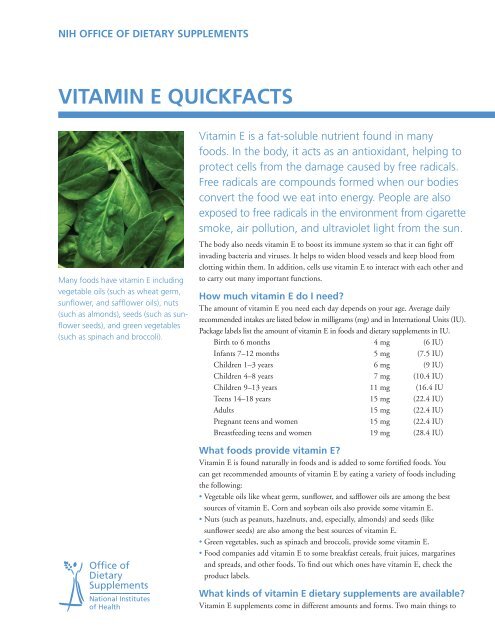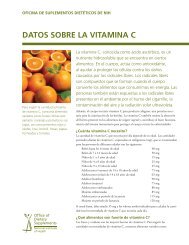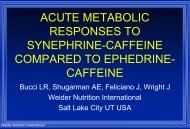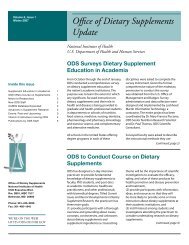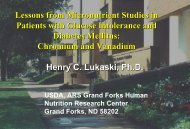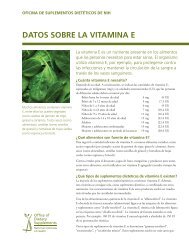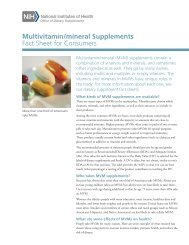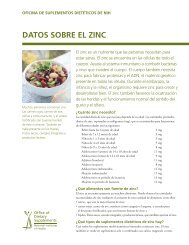Vitamin E - Office of Dietary Supplements
Vitamin E - Office of Dietary Supplements
Vitamin E - Office of Dietary Supplements
Create successful ePaper yourself
Turn your PDF publications into a flip-book with our unique Google optimized e-Paper software.
NIH OFFICE OF DIETARY SUPPLEMENTS<br />
VITAMIN E QUICKFACTS<br />
Many foods have vitamin E including<br />
vegetable oils (such as wheat germ,<br />
sunflower, and safflower oils), nuts<br />
(such as almonds), seeds (such as sunflower<br />
seeds), and green vegetables<br />
(such as spinach and broccoli).<br />
<strong>Vitamin</strong> E is a fat-soluble nutrient found in many<br />
foods. In the body, it acts as an antioxidant, helping to<br />
protect cells from the damage caused by free radicals.<br />
Free radicals are compounds formed when our bodies<br />
convert the food we eat into energy. People are also<br />
exposed to free radicals in the environment from cigarette<br />
smoke, air pollution, and ultraviolet light from the sun.<br />
The body also needs vitamin E to boost its immune system so that it can fight <strong>of</strong>f<br />
invading bacteria and viruses. It helps to widen blood vessels and keep blood from<br />
clotting within them. In addition, cells use vitamin E to interact with each other and<br />
to carry out many important functions.<br />
How much vitamin E do I need<br />
The amount <strong>of</strong> vitamin E you need each day depends on your age. Average daily<br />
recommended intakes are listed below in milligrams (mg) and in International Units (IU).<br />
Package labels list the amount <strong>of</strong> vitamin E in foods and dietary supplements in IU.<br />
Birth to 6 months 4 mg (6 IU)<br />
Infants 7–12 months 5 mg (7.5 IU)<br />
Children 1–3 years 6 mg (9 IU)<br />
Children 4–8 years 7 mg (10.4 IU)<br />
Children 9–13 years 11 mg (16.4 IU<br />
Teens 14–18 years 15 mg (22.4 IU)<br />
Adults 15 mg (22.4 IU)<br />
Pregnant teens and women 15 mg (22.4 IU)<br />
Breastfeeding teens and women 19 mg (28.4 IU)<br />
What foods provide vitamin E<br />
<strong>Vitamin</strong> E is found naturally in foods and is added to some fortified foods. You<br />
can get recommended amounts <strong>of</strong> vitamin E by eating a variety <strong>of</strong> foods including<br />
the following:<br />
• Vegetable oils like wheat germ, sunflower, and safflower oils are among the best<br />
sources <strong>of</strong> vitamin E. Corn and soybean oils also provide some vitamin E.<br />
• Nuts (such as peanuts, hazelnuts, and, especially, almonds) and seeds (like<br />
sunflower seeds) are also among the best sources <strong>of</strong> vitamin E.<br />
• Green vegetables, such as spinach and broccoli, provide some vitamin E.<br />
• Food companies add vitamin E to some breakfast cereals, fruit juices, margarines<br />
and spreads, and other foods. To find out which ones have vitamin E, check the<br />
product labels.<br />
What kinds <strong>of</strong> vitamin E dietary supplements are available<br />
<strong>Vitamin</strong> E supplements come in different amounts and forms. Two main things to
VITAMIN E QUICKFACTS<br />
consider when choosing a vitamin E supplement are:<br />
1. The amount <strong>of</strong> vitamin E: Most once-daily multivitaminmineral<br />
supplements provide about 30 IU <strong>of</strong> vitamin E,<br />
whereas vitamin E-only supplements usually contain 100 to<br />
1,000 IU per pill. The doses in vitamin E-only supplements<br />
are much higher than the recommended amounts. Some<br />
people take large doses because they believe or hope that<br />
doing so will keep them healthy or lower their risk <strong>of</strong><br />
certain diseases.<br />
2. The form <strong>of</strong> vitamin E: Although vitamin E sounds like<br />
a single substance, it is actually the name <strong>of</strong> eight related<br />
compounds in food, including alpha-tocopherol. Each form<br />
has a different potency, or level <strong>of</strong> activity in the body.<br />
<strong>Vitamin</strong> E from natural (food) sources is listed as “d-alphatocopherol”<br />
on food packaging and supplement labels.<br />
Synthetic (laboratory-made) vitamin E is listed as “dl-alphatocopherol.”<br />
The natural form is more potent. For example,<br />
100 IU <strong>of</strong> natural vitamin E is equal to about 150 IU <strong>of</strong> the<br />
synthetic form.<br />
Some vitamin E supplements provide other forms <strong>of</strong> the<br />
vitamin, such as gamma-tocopherol, tocotrienols, and mixed<br />
tocopherols. Scientists do not know if any <strong>of</strong> these forms are<br />
superior to alpha-tocopherol in supplements.<br />
Am I getting enough vitamin E<br />
The diets <strong>of</strong> most Americans provide less than the recommended<br />
amounts <strong>of</strong> vitamin E. Nevertheless, healthy people<br />
rarely show any clear signs that they are not getting enough<br />
vitamin E (see next question for information on the signs <strong>of</strong><br />
vitamin E deficiency).<br />
What happens if I don’t get enough<br />
vitamin E<br />
<strong>Vitamin</strong> E deficiency is very rare in healthy people. It is almost<br />
always linked to certain diseases where fat is not properly<br />
digested or absorbed. Examples include Crohn’s disease, cystic<br />
fibrosis, and certain rare genetic diseases such as abetalipoproteinemia<br />
and ataxia with vitamin E deficiency (AVED).<br />
<strong>Vitamin</strong> E needs some fat for the digestive system to absorb it.<br />
<strong>Vitamin</strong> E deficiency can cause nerve and muscle damage<br />
that results in loss <strong>of</strong> feeling in the arms and legs, loss <strong>of</strong> body<br />
movement control, muscle weakness, and vision problems.<br />
Another sign <strong>of</strong> deficiency is a weakened immune system.<br />
What are some effects <strong>of</strong> vitamin E<br />
on health<br />
Scientists are studying vitamin E to see how it affects health.<br />
Here are several examples <strong>of</strong> what this research has shown.<br />
Heart disease<br />
Some studies link higher intakes <strong>of</strong> vitamin E from supplements<br />
to lower chances <strong>of</strong> developing heart disease. But the<br />
best research finds no benefit. People in these studies are<br />
randomly assigned to take vitamin E or a placebo (dummy<br />
pill with no vitamin E or active ingredients) and they don’t<br />
know which they are taking. <strong>Vitamin</strong> E supplements do not<br />
seem to prevent heart disease, reduce its severity, or affect the<br />
risk <strong>of</strong> death from this disease. Scientists do not know whether<br />
high intakes <strong>of</strong> vitamin E might protect the heart in younger,<br />
healthier people who do not have a high risk <strong>of</strong> heart disease.<br />
Cancer<br />
Most research indicates that vitamin E does not help prevent<br />
cancer and may be harmful in some cases. Large doses <strong>of</strong><br />
vitamin E have not consistently reduced the risk <strong>of</strong> colon and<br />
breast cancer in studies, for example. A large study found<br />
that taking vitamin E supplements (400 IU/day) for several<br />
years increased the risk <strong>of</strong> developing prostate cancer in men.<br />
Two studies that followed middle-aged men and women for<br />
7 or more years found that extra vitamin E (300–400 IU/day,<br />
on average) did not protect them from any form <strong>of</strong> cancer.<br />
However, one study found a link between the use <strong>of</strong> vitamin<br />
E supplements for 10 years or more and a lower risk <strong>of</strong> death<br />
from bladder cancer.<br />
<strong>Vitamin</strong> E dietary supplements and other antioxidants might<br />
interact with chemotherapy and radiation therapy. People<br />
undergoing these treatments should talk with their doctor<br />
or oncologist before taking vitamin E or other antioxidant<br />
supplements, especially in high doses.<br />
Eye disorders<br />
Age-related macular degeneration (AMD), or the loss <strong>of</strong><br />
central vision in older people, and cataracts are among the<br />
most common causes <strong>of</strong> vision loss in older people. The results<br />
<strong>of</strong> research on whether vitamin E can help prevent these<br />
conditions are inconsistent. Among people with early-stage<br />
AMD, a supplement containing large doses <strong>of</strong> vitamin E<br />
combined with other antioxidants, zinc, and copper showed<br />
promise for slowing down the rate <strong>of</strong> vision loss.<br />
Mental function<br />
Several studies have investigated whether vitamin E supplements<br />
might help older adults remain mentally alert and active<br />
as well as prevent or slow the decline <strong>of</strong> mental function and<br />
Alzheimer’s disease. So far, the research provides little evidence<br />
that taking vitamin E supplements can help healthy people or<br />
people with mild mental functioning problems to maintain<br />
brain health.
VITAMIN E QUICKFACTS<br />
Can vitamin E be harmful<br />
Eating vitamin E in foods is not risky or harmful. In supplement<br />
form, high doses <strong>of</strong> vitamin E might increase the risk<br />
<strong>of</strong> bleeding (by reducing the blood’s ability to form clots after<br />
a cut or injury) and <strong>of</strong> serious bleeding in the brain (known<br />
as hemorrhagic stroke). The highest safe level <strong>of</strong> intake from<br />
supplements for adults is 1,500 IU/day for natural forms <strong>of</strong><br />
vitamin E and 1,100 IU/day for the synthetic form. The<br />
highest safe levels for children are lower than for adults. Some<br />
recent research suggests that intakes <strong>of</strong> vitamin E below these<br />
upper safe levels could increase the risk <strong>of</strong> prostate cancer in<br />
men. <strong>Vitamin</strong> E might also increase the risk <strong>of</strong> death in some<br />
adults with chronic health conditions, but this does not seem<br />
to be the case in healthy people.<br />
Are there any interactions with vitamin E<br />
that I should know about<br />
<strong>Vitamin</strong> E dietary supplements can interact or interfere with<br />
certain medicines that you take. Here are some examples:<br />
• <strong>Vitamin</strong> E can increase the risk <strong>of</strong> bleeding in people taking<br />
anticoagulant or antiplatelet medicines, such as warfarin<br />
(Coumadin ® ).<br />
• In one study, vitamin E plus other antioxidants (such as<br />
vitamin C, selenium, and beta-carotene) reduced the<br />
heart-protective effects <strong>of</strong> two drugs taken in combination<br />
(a statin and niacin) to affect blood-cholesterol levels.<br />
• Taking antioxidant supplements while undergoing<br />
chemotherapy or radiation therapy for cancer could<br />
alter the effectiveness <strong>of</strong> these treatments.<br />
Tell your doctor, pharmacist, and other health care providers<br />
about any dietary supplements and medicines you take. They<br />
can tell you if those dietary supplements might interact or<br />
interfere with your prescription or over-the-counter medicines<br />
or if the medicines might interfere with how your body<br />
absorbs, uses, or breaks down nutrients.<br />
Where can I find out more about vitamin E<br />
For general information on vitamin E:<br />
• <strong>Office</strong> <strong>of</strong> <strong>Dietary</strong> <strong>Supplements</strong> Health Pr<strong>of</strong>essional Fact<br />
Sheet on <strong>Vitamin</strong> E<br />
• <strong>Vitamin</strong>s, MedlinePlus ®<br />
For more information on food sources <strong>of</strong> vitamin E:<br />
• U.S. Department <strong>of</strong> Agriculture’s (USDA) National<br />
Nutrient Database<br />
• <strong>Vitamin</strong> E Content <strong>of</strong> Selected Foods, USDA<br />
For more advice on buying dietary supplements:<br />
• <strong>Office</strong> <strong>of</strong> <strong>Dietary</strong> <strong>Supplements</strong> Frequently Asked Questions:<br />
Which brand(s) <strong>of</strong> dietary supplements should I purchase<br />
For information on the government’s food<br />
guidance system:<br />
• MyPlate<br />
• <strong>Dietary</strong> Guidelines for Americans<br />
Disclaimer<br />
This fact sheet by the <strong>Office</strong> <strong>of</strong> <strong>Dietary</strong> <strong>Supplements</strong> provides<br />
information that should not take the place <strong>of</strong> medical advice.<br />
We encourage you to talk to your health care providers (doctor,<br />
registered dietitian, pharmacist, etc.) about your interest in,<br />
questions about, or use <strong>of</strong> dietary supplements and what may<br />
be best for your overall health. Any mention in this publication<br />
<strong>of</strong> a specific brand name is not an endorsement <strong>of</strong> the product.<br />
For more information on this and other supplements, please visit our Web site at:<br />
http://ods.od.nih.gov or e-mail us at: ods@nih.gov<br />
Reviewed: October 11, 2011


